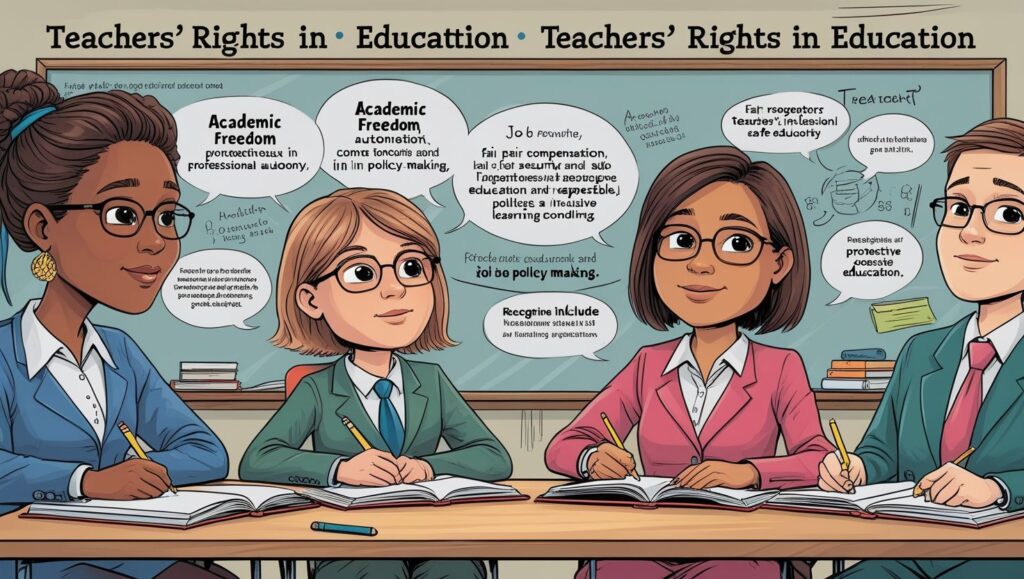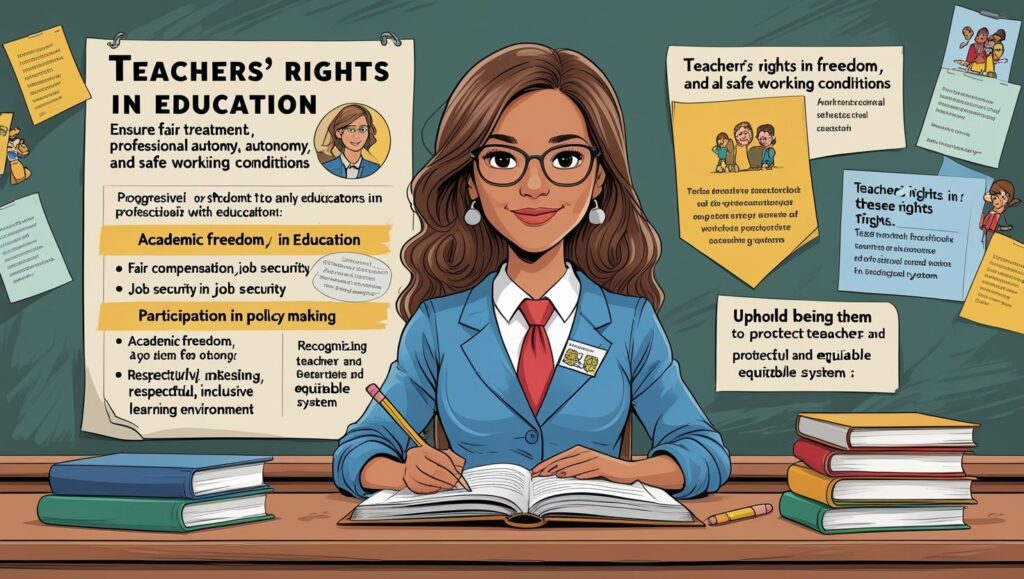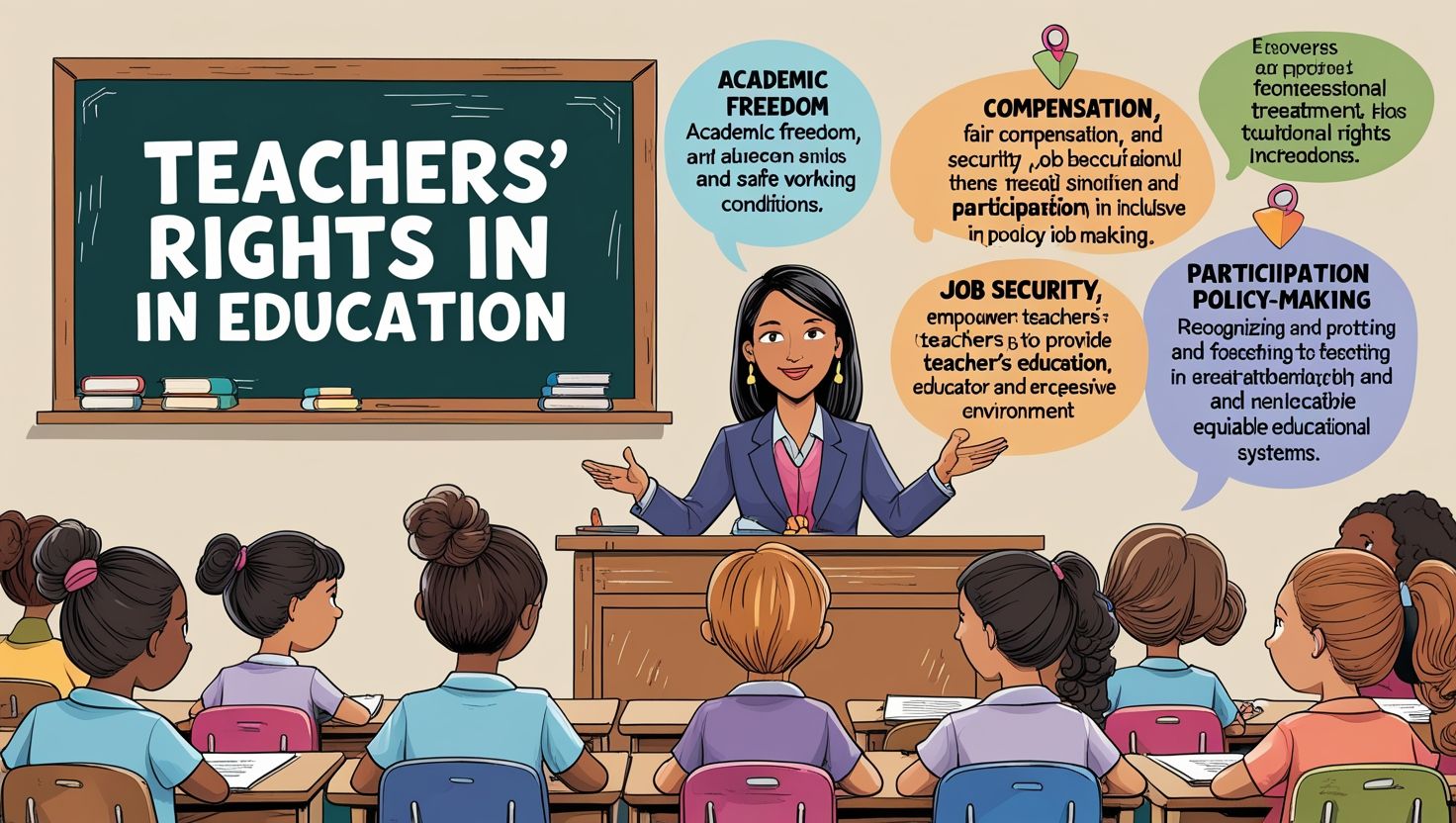1. Introduction
Teachers’ Rights in Education, Teachers are the backbone of any educational system, and their rights play a crucial role in ensuring that learning environments are productive, fair, and just. Teachers’ rights refer to the legal, professional, and personal entitlements that educators possess by virtue of their profession. These rights range from academic freedom, job security, and safe working conditions to the right to unionize and receive fair compensation. Recognition of these rights is fundamental in empowering teachers to perform their duties effectively, without fear of discrimination or retaliation.
Over time, the global education system has evolved to emphasize the importance of protecting teachers’ rights, seeing them as essential not only for educators but also for students and the education sector as a whole. By safeguarding these rights, societies invest in sustainable and high-quality education. Unfortunately, teachers in many parts of the world still face challenges such as political interference, workload stress, lack of resources, and unsafe environments. Therefore, advocating for teachers’ rights is a step toward equity, respect, and excellence in education.
2. The Right to Academic Freedom
Academic freedom is the cornerstone of educational integrity. It allows teachers to explore ideas, teach controversial topics, and express academic opinions without fear of censorship or punishment. This right supports the development of critical thinking among students and enables teachers to use innovative and diverse teaching methods. Academic freedom includes the ability to select course content, design syllabi, conduct research, and publish findings, as long as these align with the institution’s mission and ethical standards. Without this right, education becomes rigid and restricted, ultimately impairing student learning.
While many democratic societies enshrine academic freedom in law, others limit it through government control or curriculum mandates. Teachers often face pressures from administrators, political bodies, or parent organizations that challenge this right. Upholding academic freedom ensures that education remains dynamic, relevant, and open to evolution. It empowers teachers to question norms, propose new solutions, and nurture free-thinking individuals. Protecting this right is essential for academic progress, innovation, and the development of an informed citizenry.
3. The Right to Fair Compensation
Teachers deserve to be paid fairly for their work, reflecting the significance and complexity of their role. Fair compensation encompasses salary, benefits, retirement plans, and other financial incentives that recognize the professional and emotional labor involved in teaching. Unfortunately, teachers in many countries receive wages that are disproportionately low compared to their qualifications and responsibilities. This contributes to burnout, high turnover rates, and a decline in the profession’s attractiveness. When teachers fairly compensated, they are more motivated and capable of investing in their students and their own professional development.
Moreover, appropriate salaries can help bridge gender pay gaps, as women dominate the teaching profession in many nations. Fair compensation should aligned with inflation, workload, and regional economic standards. Governments, education boards, and policymakers must prioritize education budgets and treat teacher compensation as an investment in societal progress. Recognizing teachers as professionals—not volunteers—is a step toward creating a strong and resilient education system.
4. The Right to Safe and Respectful Working Conditions
A teacher’s workplace should be a safe, respectful, and supportive environment. This right ensures that educators protected from physical harm, psychological abuse, harassment, and discrimination. In many regions, teachers face threats from students, parents, or even political actors, which severely affect their mental health and job performance. Ensuring physical safety includes having secure infrastructure, emergency protocols, and access to mental health resources. Equally important is emotional and psychological safety.
Teachers must be treated with dignity and respect by students, administrators, colleagues, and parents. Respectful working conditions also involve reasonable class sizes, manageable workloads, adequate teaching resources, and opportunities for professional collaboration. Violation of these rights leads to stress, absenteeism, and attrition. Schools and educational institutions must develop policies to ensure a culture of mutual respect, implement anti-bullying strategies, and provide support mechanisms. Ensuring these rights fosters a positive environment that not only benefits teachers but also enhances student learning outcomes and school community health.
5. The Right to Job Security and Due Process
Job security provides teachers with stability and confidence in their professional roles. It assures that employment cannot be terminated arbitrarily, and that educators are entitled to a fair and transparent process when their performance or behavior is under review. This right often institutionalized through tenure, contracts, or employment protections offered by unions. Teachers with job security are better able to focus on teaching without the constant fear of dismissal due to political pressures, administrative disagreements, or social biases.
Due process includes timely notification of allegations, a chance to respond, and access to a fair hearing before any punitive action is taken. Without these protections, educators may become vulnerable to exploitation or forced to conform to non-pedagogical expectations. Unfortunately, in many regions, temporary contracts and privatized education systems erode job security, leaving teachers in precarious positions. Protecting this right not only empowers teachers but also helps retain experienced professionals in the field, ultimately benefiting students and schools.

6. The Right to Professional Development
Professional development is an essential right that allows teachers to grow, adapt, and improve throughout their careers. This includes access to training, workshops, seminars, advanced degrees, and other learning opportunities. A well-informed and constantly updated teacher is more effective, confident, and capable of integrating new pedagogical strategies, technologies, and classroom management techniques. Governments and institutions have a duty to provide these opportunities regularly and equitably. Often, budget constraints or lack of vision lead to neglect of this crucial right, leaving teachers feeling stagnant or disconnected from modern educational advancements.
Moreover, continuous professional development helps teachers understand diverse learner needs, including those of students with disabilities or from different cultural backgrounds. It also reinforces ethical standards, leadership skills, and curriculum understanding. When teachers are empowered to learn, they model lifelong learning to students. Thus, investing in teacher development is an investment in educational quality. This right must be integrated into national education policies with funding, time allocation, and institutional encouragement.
7. The Right to Unionize and Collective Bargaining
The right to unionize allows teachers to organize, advocate, and negotiate collectively for their rights, benefits, and working conditions. Unions play a vital role in empowering teachers, ensuring their voices heard in policy-making, and protecting them from unjust practices. Collective bargaining enables educators to negotiate salaries, health benefits, retirement plans, class sizes, and safety protocols with their employers. This democratic process promotes transparency, accountability, and fairness in the education sector.
However, in some countries, teachers are discouraged or even legally prohibited from forming unions, which leaves them vulnerable to exploitation. Strong unions can influence education reforms, fight for increased funding, and promote policies that support both teachers and students. While union activities must be responsible and constructive, their existence ensures that power not one-sided. Governments and school administrations should recognize and engage with teacher unions as legitimate partners in educational development. Ensuring this right contributes to a more balanced, ethical, and participatory education system.
8. The Right to Equal Treatment and Non-Discrimination
Teachers are entitled to equality and protection against all forms of discrimination, including those based on gender, race, religion, age, disability, political beliefs, or sexual orientation. Equal treatment ensures that every educator receives fair opportunities for hiring, promotion, training, and professional recognition. Discriminatory practices can severely damage morale, reduce motivation, and create toxic environments within schools. Unfortunately, in many contexts, teachers—particularly women and others —face bias in recruitment, salary structures, and leadership appointments.
Legal frameworks and school policies must enforce anti-discrimination laws, with clear mechanisms for addressing complaints. Furthermore, inclusivity training for staff and administrators is vital in creating awareness and eliminating unconscious biases. Equal treatment promotes a diverse teaching force that reflects the student body and society at large. This diversity brings richness to classroom discussions and models tolerance, respect, and fairness to students. Upholding this right is essential to building an equitable and inclusive education system where every teacher can contribute fully.
9. The Right to Participate in Policy Making
Teachers have the right to participate in the shaping of education policies that directly affect their profession and students’ learning environments. This right acknowledges that those who are on the frontlines of education possess valuable insights into what works and what doesn’t in classrooms. Teachers should be involved in curriculum design, assessment strategies, resource allocation, and policy reforms through advisory boards, working groups, and government consultations. Too often, educational policies are made without input from teachers, resulting in impractical or counterproductive mandates.
Giving teachers a seat at the decision-making table enhances accountability and ensures that policies are grounded in classroom realities. It also fosters a sense of ownership, motivation, and alignment between educators and administrators. This right is especially important in times of reform or crisis, such as during shifts to remote learning or post-pandemic recovery. Establishing regular dialogue channels and encouraging participatory governance in education is a vital step toward better educational outcomes and systemic integrity.

10. Global and Legal Perspectives on Teachers’ Rights
Globally, various frameworks support and promote teachers’ rights. The International Labour Organization (ILO) and UNESCO have laid out recommendations that emphasize teachers’ employment conditions, professional freedom, and social security. Countries that have signed such international agreements are expected to align their national laws accordingly. However, the implementation of these rights varies widely across regions. In developed nations, teachers often enjoy robust legal protections, strong unions, and institutional respect.
In contrast, educators in developing or politically unstable countries frequently face poor pay, lack of security, and limited autonomy. International watchdogs, NGOs, and educational alliances play a critical role in monitoring and advocating for these rights. National constitutions, labor laws, and education acts must embed these international standards into enforceable domestic regulations. Teachers must also be educated about their rights to defend them effectively. Governments, institutions, and civil society must work collaboratively to uphold legal standards, promote justice, and strengthen teachers’ position in the global education landscape.
11. Conclusion:
Teachers’ rights are not mere privileges—they are essential elements of a functional, equitable, and high-performing education system. When teachers are respected, protected, and empowered, they are better equipped to inspire, educate, and transform lives. Every right—from fair pay to academic freedom, from union representation to professional growth—enriches the teaching experience and by extension, enhances student outcomes. A society that neglects its educators risks stalling its intellectual, social, and economic development.
Conversely, one that safeguards teachers’ rights fosters innovation, critical thinking, and civic responsibility. It is imperative for governments, institutions, and communities to not only recognize these rights but also to implement and uphold them in spirit and in law. Empowered teachers build empowered students. In the end, honoring the rights of educators is not just about justice for teachers—it’s about building the foundation for a better, more enlightened future.

Teachers guide is a very helpful for teachers.thnx
rnirhywrwkplwhpmtzyjfehqstnutk
LeoVegas https://amsterdam-online.nl/wp-content/pgs/leovegas-casino-online-nederland.html
These are all great but to execise that right normally finds you without a job.